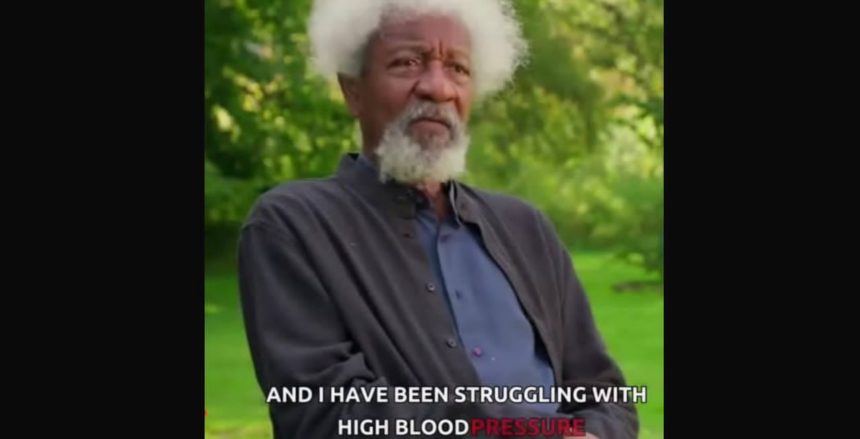“My name is Wole Soyinka, and I have been struggling with high blood pressure for over 15 years”. This excerpt is the opening line of an artificial intelligence (AI) generated video showing a figure that appears to be Wole Soyinka, the popular Nigerian Nobel laureate, advertising a hypertension medication. The altered video of Soyinka appears once during the period of analysis.
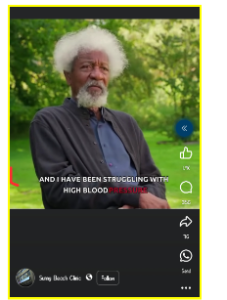
A screenshot of an AI-generated video posted on Facebook reel, showing a figure that appears like Wole Soyinka advertising a high blood pressure drug.
Daily, thousands of AI-generated videos advertising health-related products in the form of testimonial ads flood social media platforms, especially Facebook. These AI-generated videos of popular personalities like politicians, celebrities, and television and radio presenters are designed with a simple goal — to drive false narratives in the social media space.
For this report, several AI-generated videos advertising health-related products on Facebook were analysed. These AI-generated videos are used to market dubious drugs for high blood pressure, hypertension, and diabetes, among others, preying on vulnerable individuals seeking affordable healthcare solutions.
USING MANIPULATED VIDEOS OF EXPERTS
The most common form of manipulation involves numerous videos featuring Samuel Achilefu, a Nigerian-born cancer imaging researcher, esteemed for inventing cancer goggles designed to help surgeons easily differentiate between malignant and healthy cells during operations.
These manipulated videos of Achielefu are being used to lend credibility to dubious health-related products that are touted as cures for hypertension, high blood pressure, and diabetes, among others. These videos, widely shared on Facebook, pose significant risks to public health by promoting unverified and potentially harmful treatments.
At the centre of these deceptive practices is a Facebook page named Suhileaten, which has over 13,000 followers. The page transparency of the Suhileaten Facebook page shows that the page was created on April 17, 2024. It was also indicated that Ukraine is the primary country of the people who managed the page.
This page shared a manipulated video with a statement attributed to Achilefu that asserts, “I have cured thousands of people with cancer, and this year, we are going to end hypertension.”
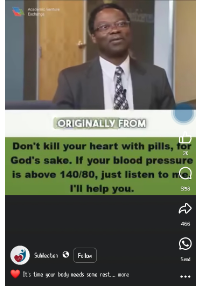
A screenshot of the video posted by Suhileaten
However, upon closer inspection, it becomes evident that the video was a deep fake, particularly around the mouth region, and a voiceover mimicking Achilefu was superimposed to create a misleading endorsement.
A reverse image search revealed that the original video, later manipulated by the Suhileaten Facebook page, was first shared on the YouTube channel of the Office of Technology Management at Washington University in St. Louis in 2010. This video featured an interview with Samuel Achilefu, during which he discussed his pioneering research on cancer goggles.

A screenshot of the YouTube page where the original video was published.
At the end of the video, Achielefu seemingly says, ‘I will leave a link to the detailed article below the video. Save yourself, your family, and your friends”. A click on the website link attached to the comment section of the video leads to a poor clone of the Qatar-based news platform, Al Jazeera. In the post, people were asked to throw away verified drugs for high blood pressure like Losartan and Enalapril for their choice drug. This poses a health risk to ignorant viewers who may come across this webpage.
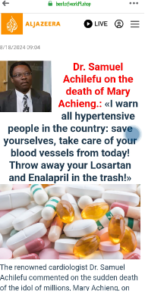
A screenshot of the landing page of the website (taken 27/August/2024 via mobile phone)
A click on the logo of Al Jazeera will automatically bring someone down to a section of the website showing how to buy a product for high blood pressure named “cardizoom”. The price tag quoted on the product is N49,000.


A screenshot showing the advertised product
Interestingly, this website is dynamic, with changing elements. Users who visit the website for the first time are made to believe that they have come across a rare opportunity to get the product at a discounted price of N49,000 instead of N98,000. However, continuous monitoring of the website shows that the date for the half-price promo changes to include the current date the website is accessed as its last day. This technique seems to drive users to make quick purchases to take advantage of the low price offered during the promo. The promo period always spans a week (7 days).

A screenshot showing the dates for the promo changing to deceive the viewer into making a quick purchase
The website also shares an alleged interaction with Peter Odinga, the alleged president of the Union of Pharmacists of Nigeria who responds harshly and hangs up the call when asked why Nigerian pharmacies do not sell the drug. This is done to create the illusion that pharmaceutical agencies are not selling Cardizoom to keep making a profit from patients with hypertension.
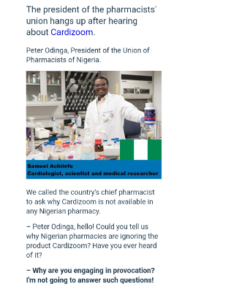
A screenshot showing fictitious conversation with one Peter Odinga
The website also indicated fictitious reviews by manufactured names of those who have purportedly used the advertised health-related products.
However, investigation shows that the named union is fictitious. Nigeria has no ‘Union of Pharmacists of Nigeria’. Rather there is the Pharmaceutical Society of Nigeria established in 1927. Its current president is Pharm. (Prof). Cyril O. Usifoh. All information about the society can be found on its website, including members of its National Executive Committee.
Another feature of the website is that when accessed through a laptop, it shows a different landing page, unlike the mobile phone version. The website’s laptop version showed that it was built with Framer. Framer is a tool used for rapid prototyping. The website built using Framer raised immediate red flags about its legitimacy. Some buttons are unresponsive, and the page is a bit scattered.
It notably listed a team of so-called experts, including ‘Dr. Samuel Green’ as the master herbologist, ‘Dr. Willow Sage’ as the chief formulation officer, and ‘Professor Aspen Bark’ as the head of research. However, a reverse image search revealed that the photos of these supposed experts were sourced from the internet, further indicating that these identities are likely fabricated. The website stated that it was created on August 3, 2024.
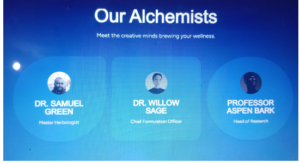
A Screenshot of the website shows names listed as experts
The image attributed to ‘Dr Samuel Green’ has been online since 2019. It is an image that multiple websites have used for ad testimonials and fictitious biographies. The image can be seen here, here, and here, and listed as wallpaper here. The image attributed to ‘Dr. Willow Sage’ was first posted on Unsplash, a digital platform where people can get pictures and wallpapers for free. The image was published on August 17, 2018, by Aiony Haust, a digital photographer. The image has appeared here, here, and here. Like the second image, the third image attributed to ‘Professor Aspen Bark’ was posted on Unsplash by Lucas Gouvêa on October 4, 2019.
The same altered video of Achilefu was also used by another Facebook page — FitFlex — to market another alleged hypertension cure. FitFlex has over 863 followers and was created on 28 May, 2024. The Facebook page sponsored the post of the video, leading to high interactions with 3,900 likes, 308 comments, and 915 shares. This account is run from the United Kingdom.
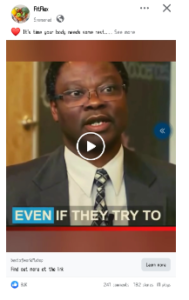
A screenshot of the sponsored Facebook post
The sponsored post video opens with a manipulated clip showing Arise TV presenter, Ojinika Anne Okpe, saying “Scandal on air. A well-known cardiologist has been attacked by representatives of pharmaceutical companies for revealing a secret cure for hypertension”.
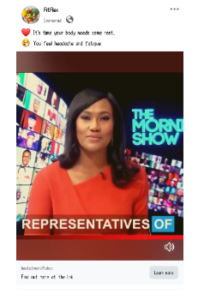
A screenshot of the video showing Okpe
Okpe is a presenter with Arise TV, a broadcasting station in Nigeria. She is popular for hosting a segment of the Morning Show programme titled: What is Trending? The video clip of Okpe used for the manipulated video was taken from the episode of her show, published on the YouTube page of Arise TV on May 21, 2024.
The manipulated video is designed to make people believe that Achielefu is being attacked for revealing a permanent cure for high blood pressure. A closer look at the video shows that the lips were manipulated and a voiceover was superimposed on the image of Achielefu to make it.
A website link was attached to the video caption, calling viewers to click the link to learn more. The link opens to the same post as the link attached to Suhileaten’s video.
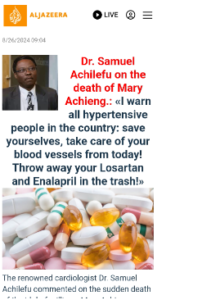
Screenshot of the landing page of the website
Unlike the link attached to Suhileaten’s video, the website has the same landing page on a mobile phone and laptop.
However, a click on the logo of Al Jazeera will automatically bring someone down to a section of the website for a natural supplement product named ‘Cordis’. The product is being sold on promo at N44,990.

A screenshot showing the advertised product
In both cases highlighted above, the Facebook accounts and associated web pages were created in 2024, indicating that this is a relatively new technique used to target users on social media. While the pages are not run in Nigeria, the content is made to target vulnerable Nigerians, among other users.
It was also observed that the two aforementioned Facebook accounts shared website links that have almost the same content. Although those operating the two accounts are not from the same location, it appears that those managing the pages are a syndicate that specialises in advertising dubious drugs for high blood pressure, hypertension, and diabetes to defraud unsuspecting persons
TECHNIQUES USED IN THE VIDEO MANIPULATION
During the analysis of the AI-generated videos, it was observed that some of the video clips were obtained from previous interviews done by Achilefu. A YouTube video of Okpe’s show was also used for the video manipulation. This shows that those who created the AI-generated videos make use of original videos of personalities that have been previously published on the internet.
OTHER TECHNIQUES USED
Deep Fakes: The Disarm Framework tactic ‘Develop AI-Generated Images (Deepfakes)’ defines deepfakes as AI-generated falsified photos, videos, or soundbites. An influence operation may use deepfakes to depict an inauthentic situation by synthetically recreating an individual’s face, body, voice, and physical gestures.
AI tools were used to manipulate the mouth movements of Achilefu to match a different audio track, making it appear as if he was passing a message to endorse a drug. In a video by Suhileaten, Achielefu’s voice was cloned to generate a new audio track and mixed with deep fakes to match his mouth movements to what was said to endorse a drug. AI was also used to generate voiceovers that were used to provide a convincing narrative about the video.
Misleading Context: The Disarm tactic ‘Reframe Context‘ is defined as removing an event from its surrounding context to distort its intended meaning. Rather than deny that an event occurred, reframing context frames an event in a manner that may lead the target audience to draw a different conclusion about its intentions. Videos of protests from different countries were merged to purport the narrative that people were protesting big pharmaceutical companies for purporting to silence Achilefu for making the drug to cure high blood pressure.
DECEPTIVE AI-GENERATED VIDEOS REMAIN ON FACEBOOK DESPITE BREAKING COMMUNITY STANDARDS
Facebook community standards prohibit content that “purposefully employs deceptive means — such as wilful misrepresentation, stolen information, and exaggerated claims — to either scam or defraud users and businesses, or to drive engagement”.
The deceptive AI-generated videos used to advertise health-related products employ deceptive means to defraud unsuspecting social media users. However, despite the community standards, thousands of these AI-generated videos are still on Facebook.
While gathering data for this report, it was also observed that the Facebook algorithm kept bringing in more health-related AI-generated videos for views.
AI-generated videos featuring public figures like Wole Soyinka and Samuel Achilefu present a growing threat in the digital age, where false narratives can easily manipulate vulnerable people. These videos, created to promote questionable health products, use deceptive tactics to defraud social media users, putting public health at serious risk. Despite Facebook’s community standards, these misleading videos continue to flood platforms, preying on people by pushing them to purchase unverified medications online.
To curb this growing trend and cut off the financial incentives driving these videos, The Cable, in partnership with Code for Africa under the AAOSI fellowship, has flagged these malicious accounts with Meta for removal.
This article was produced through a collaboration between The Cable and Code for Africa’s AAOSI programme. The AAOSI initiative is a collaborative effort to empower media and NGOs in African countries to combat disinformation and propaganda through training and resources, aiming to strengthen information integrity and foster collaboration among investigators in the region.

